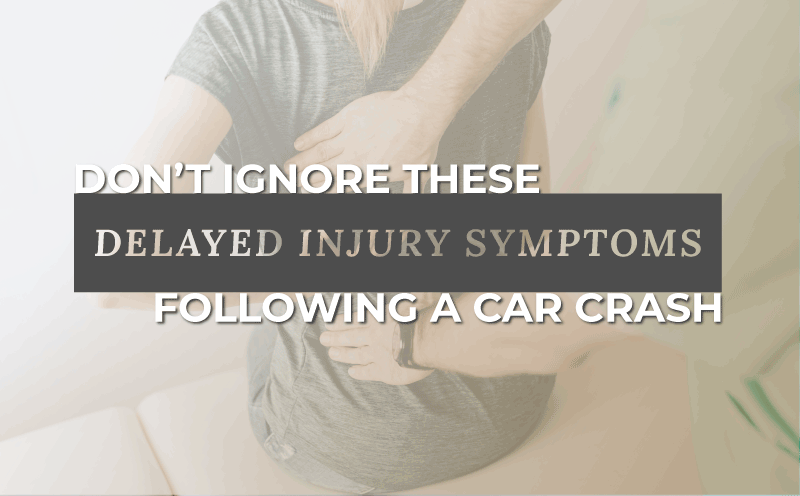Don’t Ignore These Delayed Symptoms of Injuries Following a Car Crash

While unfortunate, the reality is that the vast majority of us living in the state of Michigan will be involved in a motor vehicle accident at some point in our lives. Despite car accidents being so commonplace these days, and while the vast majority of us will walk away from a crash without so much as a scratch, others may not be so fortunate. Injuries following a car crash can be various ranging from severe and life-changing to bumps, bruises, and soreness in the days and weeks after the accident. And based on my experience handling cases like these for more than twenty years, injured people should not ignore certain symptoms and injuries following a car crash.
Injuries Following a Car Crash to Pay Attention To
This is not medical advice and I am not a doctor. However, after decades of working with people injured in Michigan motor vehicle accidents and reviewing countless medical records, some of the common symptoms that eventually turned into problems for people include:
-
- Headache – Just like you can bruise your arm or leg, your brain can also bleed and bruise as well. Arteries and veins running all around the white and gray matter of our brains can bleed just as much if not more than other parts of our bodies. If you are experiencing a headache the next day after a car accident, it is best to not ignore that headache in hopes it will just go away. Getting checked out by a medical professional is your best course of action as many brain bleeds can be relatively innocuous. Those already prone to headaches, to begin with, may feel tempted to brush aside what their body is telling them. However, brain injuries sustained in car accidents, even when the head doesn’t necessarily come into hard contact with a surface inside the vehicle, can lead to long-term problems.
- Sensitivity to light – Many times individuals that have suffered a brain injury in a motor vehicle accident report experiencing “photophobia” or sensitivity to light. They note bright lights hurt their eyes and even cause a headache. Photophobia is a common symptom of brain injury and can be a sign of a bleed.
- Nausea and vomiting – These are also some of the telltale signs that someone has suffered a brain injury. In fact, a person doesn’t even necessarily have to sustain a bleed within the brain itself to have a brain injury. Even despite the absence of a brain bleed on medical imaging, if someone is experiencing nausea and vomiting following a car accident, there’s a chance they have sustained a brain injury.
- Confusion or disorientation – Usually family members will notice this right away even though the patient may not recognize it themselves. If your loved one is doing something unusual or behaving out of the ordinary after being involved in a car crash, it could mean they have suffered a brain injury.
- Dizziness – If the world feels like it’s rotating after a car accident, it might be a symptom of a brain injury. Oftentimes people notice this in the minutes or hours after an accident and is not a warning sign to ignore.
- Lethargy – Oftentimes people with a brain injury report feeling extremely tired. Things move slowly or like they feel like they’re in a fog the day after the accident. These symptoms, also known as lethargy, may signal something more is going on.
2. Spinal Injury from a Car Accident
-
- Numbness and tingling – Have you ever hit your funny bone? Of course you have – but that’s not actually a bone you hit, it’s a nerve that runs through your elbow. When you hit that nerve it causes that all too familiar horrible numbing sensation and the tingling in your arm. That same numbness and tingling can occur in other portions of your body where a nerve has been injured. Common areas of the body that sustain nerve injury include the neck and low back, to name a few. Nerves course throughout your body, with many branching off of your spinal cord along your vertebrae. Long-term impingement of one of these nerves can lead to long-term residual problems. Those who ignore this symptom for a prolonged period of time may eventually require surgery to correct the damage.
3. Fractures from a Car Accident
-
- Inability to bear weight – Even for those of us trained at one point or another in our life to “walk it off” or “just give it a few minutes” – the inability to bear weight is a symptom to address right away. If you’re having difficulty using a part of your body as you normally would, it’s likely you’ve fractured something. However, despite this telltale sign, many people ignore it due to the fact that most broken bones aren’t, in fact, visible. Small, hairline fractures, often go unnoticed for days, even weeks, until a person can no longer stand not being able to use that part of their body as they once did. A physical exam, x-ray, and possibly a CT scan will detect these types of injuries following a car crash. Fractures left unattended too long may even start to heal incorrectly on their own, so it’s important to seek medical advice as soon as possible.
Medical Care After a Car Crash
Any car accident from minor to serious can feel overwhelming and scary. When your injuries following your car crash aren’t as noticeable or severe, it can be all too tempting to write them off, take a painkiller, and wait for the symptoms to pass. However, oftentimes your body is cluing you in that more is going on under the surface. It’s a good rule of thumb to get checked over if you are experiencing any of the above symptoms by a medical professional.
It’s also important to note that, for those with injuries following a car crash, you will want to contact your auto insurance provider and talk to them about filing a no-fault PIP claim to cover your medical expenses. In addition, while your medical coverage is obtained from your own auto insurance policy, some injuries extend beyond the physical. In instances where the other driver involved in your crash was clearly at fault, you may be able to seek a separate claim against them for “quality of life” damages, such as pain and suffering and loss of income above what is payable through your own auto no-fault policy.
This article was authored by Michigan personal injury lawyer, Kevin Komar. Kevin has skillfully handled auto accident cases throughout the state of Michigan for more than twenty years. As a longtime resident of Livingston county, he focuses much of his work on helping injured people in the handling of claims for no-fault PIP benefits as well as complex auto negligence claims against at-fault drivers in Livingston County car accidents, Oakland County car accidents, Washtenaw County car accidents, and beyond.


